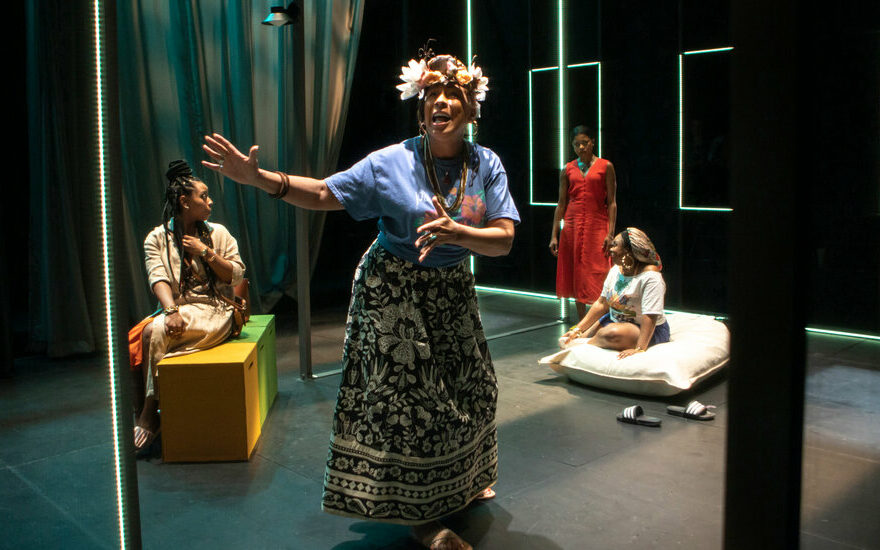Federico García Lorca described his oft-adapted “La Casa de Bernarda Alba” simply as a “drama of women in the villages of Spain.” But as the Haitian American playwright Diane Exavier knows, whenever women gather — especially during times of mourning — there is always more at stake.
Exavier takes inspiration from Lorca’s work to craft “Bernarda’s Daughters,” but she replaces the tyrannical mother of the original with the oppressive smother of a New York City summer. Bernarda — referred to here as Mommy — is never seen but lets her five daughters cycle through the family home in the Brooklyn neighborhood of Flatbush as they watch over their grandmother Florence (Tamara Tunie) and grieve their recently deceased father.
Men remain absent in this play as they do in Lorca’s, and their stench lingers. It’s partly a literal stench, represented by bushels of their father’s laundry the daughters must clean before Mommy returns. But more emblematically, it’s a figurative stink, reeking of the unappreciated sacrifices these women make for their men — especially the eldest daughter, Louise (Pascale Armand) — even long after those men are in the ground.
Mommy is absent because she’s laying her husband to rest in Haiti, where it’s “cheaper than burying someone in Brooklyn.” Much of “Bernarda’s Daughters” hinges on quips like these, which relay Exavier’s ideas about gentrification. The play rarely comments on the systemic causes of this problem but reminds us of its effects: the deafening drum of construction, the garish view of new high-rises and the proliferation of fancy coffee shops. As Bernarda’s second youngest, Adela (Taji Senior), sourly notes, “It’s a different Brooklyn out there.”
The sisters’ loss, then, is not only personal, it’s territorial. And each of Bernarda’s daughters responds differently. Grief makes the high-strung Louise greedier, the noble Harriet (Alana Raquel Bowers) hungrier for love, the ever-amorous Maryse (Malika Samuel) lustier, the righteous Adela quicker to anger, and the naïve Lena (Kristin Dodson) more dissociative, as she takes solace in her beloved reality shows. When the sisters do gather, their banter is humorous and animated. But every so often Exavier has a sister peel off to trudge through a metaphor-laced sermon.
The director, Dominique Rider, demonstrates less control over these momentum-stealing soliloquies than he does the more naturalistic dialogue, tamping down the production’s bouncy energy with low-spirited melodrama. And Carlos J. Soto’s bleak scenic design offers little help. His set is an angular cavern of black mesh curtains and obtrusive columns, the opposite of every colorful and crowded Haitian home I’ve known.
Abstraction does not serve this work, which ultimately thrives on specificity. Taking cues from island scribes like the Barbadian poet Kamau Brathwaite and the Jamaican dramatist Sylvia Wynter — whose translation of Lorca largely influenced “Bernarda’s Daughters” — Exavier uses this play to emphasize the importance of belonging to a place, and how painful it is to consign your memories of that place to the grave when its essence disappears. No wonder her characters reel off so many actual street names in the neighborhood — “the garbage all over Rogers,” “the Macy's on Fulton,” “the grill on Church.” The naming is an act of remembrance, a way to preserve a home.
Bernarda’s Daughters Through June 4 at the Pershing Square Signature Center, Manhattan; thenewgroup.org. Running time: 1 hour 30 minutes.
This review is supported by Critical Minded, an initiative to invest in the work of cultural critics from historically underrepresented backgrounds.
Source: Read Full Article
